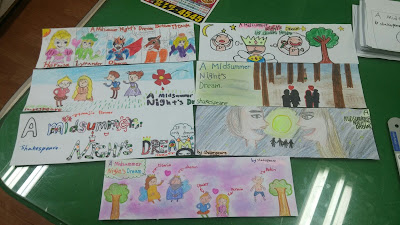I'm sad I didn't think to take more photos of these lessons. Over the course of about 2 months (7ish lessons) I read A Midsummer Night's Dream with my six 5th grade classes. It was an idea from my co-teacher, who'd heard of a competition being run by the British Council to celebrate Shakespeare's birthday (or death-day, depending on how you want to look at it.)
Every lesson, we'd review the previous part of the story from the lesson before (except for the first lesson, where we learnt all of the weird and wonderful names we'd see) and then read the next "chapter". Now obviously, I can't get a mixed level class of 10-11 year old Korean kids to just read the original Shakespearean English, so I made a sort of animated Powerpoint storybook for each Act (although to save time a lot of them were of merged).
I figured that, since Shakespeare's plays are all intended to be seen as performative art, it would probably make it a lot easier on my students if they had more visuals than text to get the meaning across.
What really helped me with this is my awesome co-teacher. Even though I'd simplified the script to within an inch of its life, to have it make any sense to most of the class it still ended up a little complex. So once I'd read out each page or sentence, she'd ask questions to check their understanding, or just directly translate if it was still too hard. We'd fill in any cultural gaps together and answer questions after each slide.
We also had quizzes and games every lesson or so to help them remember the sprawling storyline and baffling number of characters. I was really worried they wouldn't enjoy it, but I was told they liked it more than just doing the textbook, and when it started to get into all the twists and turns plot-wise, I was really happy to see their reactions, including screams of disgust when Titania wakes up to see donkey!Bottom and the whole class yelling "no! no! no!" when Puck glides across the screen to administer the love potion to Lysander, only to have him woken up by Helena. A lot of kids took particular delight in telling Lysander what a "bad man" he was when he tells Hermia exactly how much he doesn't love her.
We didn't mind how loud they were at these points, because we were just really happy with how invested they were in the story, and it showed they understood all the different threads coming together. One girl came to class one day with her own children's copy of the story in Korean, because she'd been enjoying it so much in class, and was very excited to call me over before the lesson started so that she could show me.
 |
| One of my favourite final pieces, although it was really hard to choose winners. |
After trimming and scanning all of the pictures, then labelling each file with the students' names and class numbers, we sent off this huge bundle of pictures to the British Council. We didn't win, but we did get a participatory prize, which was unexpected! I also made a prize bundle for one student in each class that I thought did a really great job with their pictures.
I'm really proud of them for sticking it out, and I think it was a really fun and challenging way for them to engage with some English text. Sure, they didn't read the original text, but I'd be surprised if you could get ENGLISH kids to fully understand that, let alone EFL students ;p







No comments:
Post a Comment